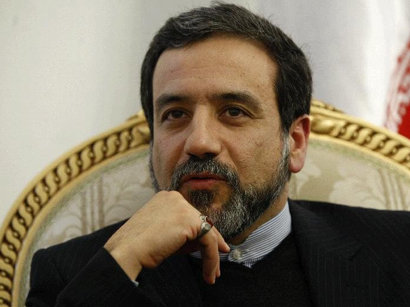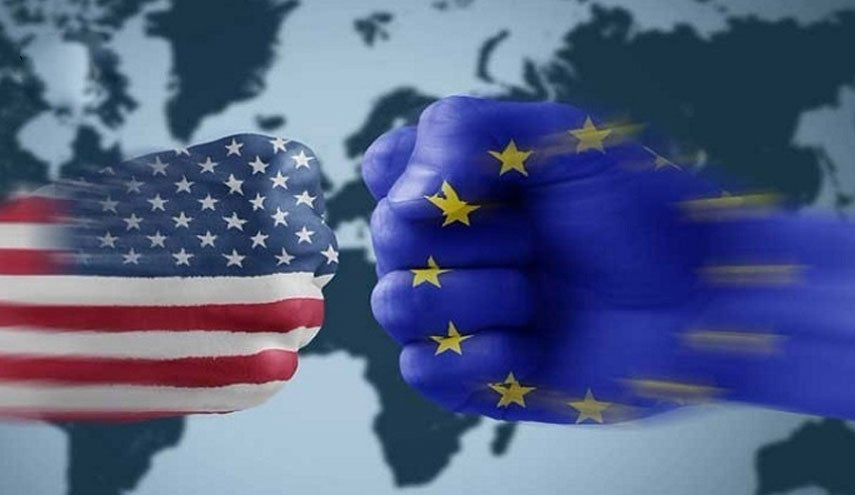
EU Plans to Counter US Bans on Iran Expected by Nov. 4


“Our timing is for Nov. 4,” Deputy Foreign Minister Abbas Araqchi said in a talk with IRNA. “Europeans should activate the proposed systems before the second round of America’s oil and banking sanctions, or at least develop the structure and have it partly operational by then.”
Araqchi noted that Nov. 4 is only a date for the “formal” imposition of sanctions, as US’ anti-Iran measures have practically come into force already.
“Sanctions have informally started, with all trading partners who will not be able to buy Iran’s oil as of Nov. 4 already beginning to rethink their purchases,” he said.
“Nothing extraordinary is supposed to happen on that day,” he stressed, trying to downplay the impact of the coming restrictions.
In May, US President Donald Trump unilaterally pulled his country out of the 2015 nuclear agreement between Iran and the six world powers, which had been hammered out over the course of two years while his predecessor Barack Obama was in office.
He almost immediately restored the first set of economic sanctions in early August and vowed a more inclusive round in November to press Tehran to return to the negotiating table to discuss new terms and conditions for a comprehensive “treaty” on its nuclear work, missile program and regional activities.
The looming sanctions chiefly target Iran's oil, the country's key export commodity, as well as banking relations.
The remaining parties to the accord, namely France, Britain, Russia, China and Germany, however, have recognized that Iran has fully and effectively implemented its commitments under the agreement, as confirmed by the 12 consecutive reports of the International Atomic Energy Agency, the UN nuclear watchdog.
> Compensatory Plans
They have been striving to salvage the deal by devising mechanisms through which Iran would be able to circumvent the US sanctions.
Along this line, updates to the EU's "Blocking Statute" and the European Investment Bank's external lending mandate to make Iran eligible took effect on August 7.
The statute bans any EU company from complying with US sanctions against firms investing in or doing business with Iran and does not recognize any court rulings that enforce American penalties.
The second decision brings Iran within the remit of EIB's external lending mandate by adding it to the list of countries outside the EU, which are eligible for EIB lending.
Another key EU measure currently under consideration is a so-called Special Purpose Vehicle to facilitate trade with Iran.
The proposal has been described as a means to create a barter system to exchange Iranian oil for European goods without money changing hands.
The SPV system was a central point of discussion in a closed-door meeting in New York last week between foreign ministers from the remaining parties to the nuclear accord and Iran, which was chaired by EU foreign policy chief, Federica Mogherini.
"The SPV aims to keep trade flowing even if possible US sanctions hit Tehran," she said.
Mogherini also told reporters earlier this week that the system will likely be established in November.


Trump weighs using $2 billion in CHIPS Act funding for critical minerals

Codelco cuts 2025 copper forecast after El Teniente mine collapse

Electra converts debt, launches $30M raise to jumpstart stalled cobalt refinery

Barrick’s Reko Diq in line for $410M ADB backing

Abcourt readies Sleeping Giant mill to pour first gold since 2014

Nevada army depot to serve as base for first US strategic minerals stockpile

SQM boosts lithium supply plans as prices flick higher

Viridis unveils 200Mt initial reserve for Brazil rare earth project

Tailings could meet much of US critical mineral demand – study

Kyrgyzstan kicks off underground gold mining at Kumtor

Kyrgyzstan kicks off underground gold mining at Kumtor

KoBold Metals granted lithium exploration rights in Congo

Freeport Indonesia to wrap up Gresik plant repairs by early September

Energy Fuels soars on Vulcan Elements partnership

Northern Dynasty sticks to proposal in battle to lift Pebble mine veto

Giustra-backed mining firm teams up with informal miners in Colombia

Critical Metals signs agreement to supply rare earth to US government-funded facility

China extends rare earth controls to imported material

Galan Lithium proceeds with $13M financing for Argentina project

Kyrgyzstan kicks off underground gold mining at Kumtor

Freeport Indonesia to wrap up Gresik plant repairs by early September

Energy Fuels soars on Vulcan Elements partnership

Northern Dynasty sticks to proposal in battle to lift Pebble mine veto

Giustra-backed mining firm teams up with informal miners in Colombia

Critical Metals signs agreement to supply rare earth to US government-funded facility

China extends rare earth controls to imported material

Galan Lithium proceeds with $13M financing for Argentina project

Silver price touches $39 as market weighs rate cut outlook

















